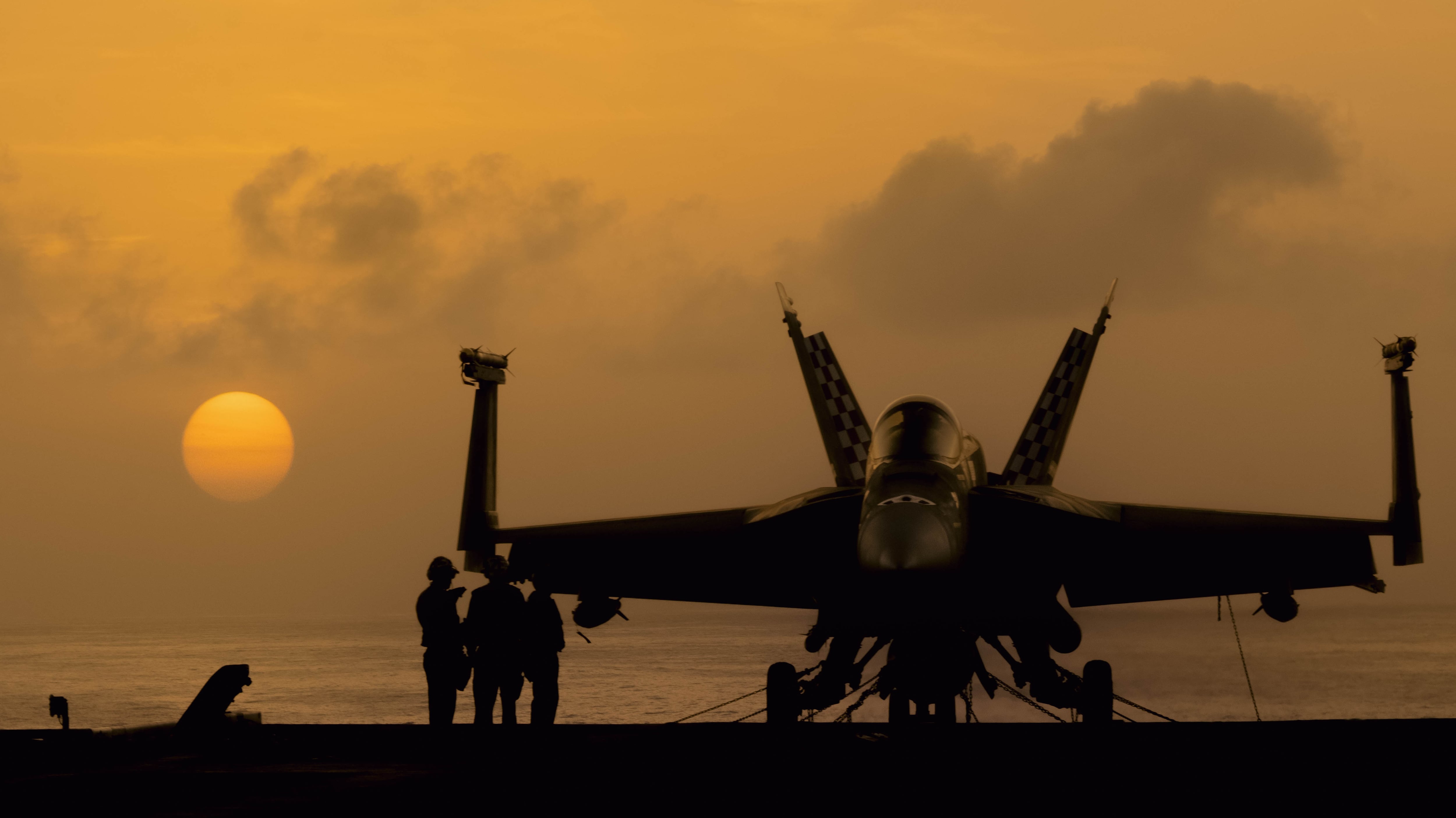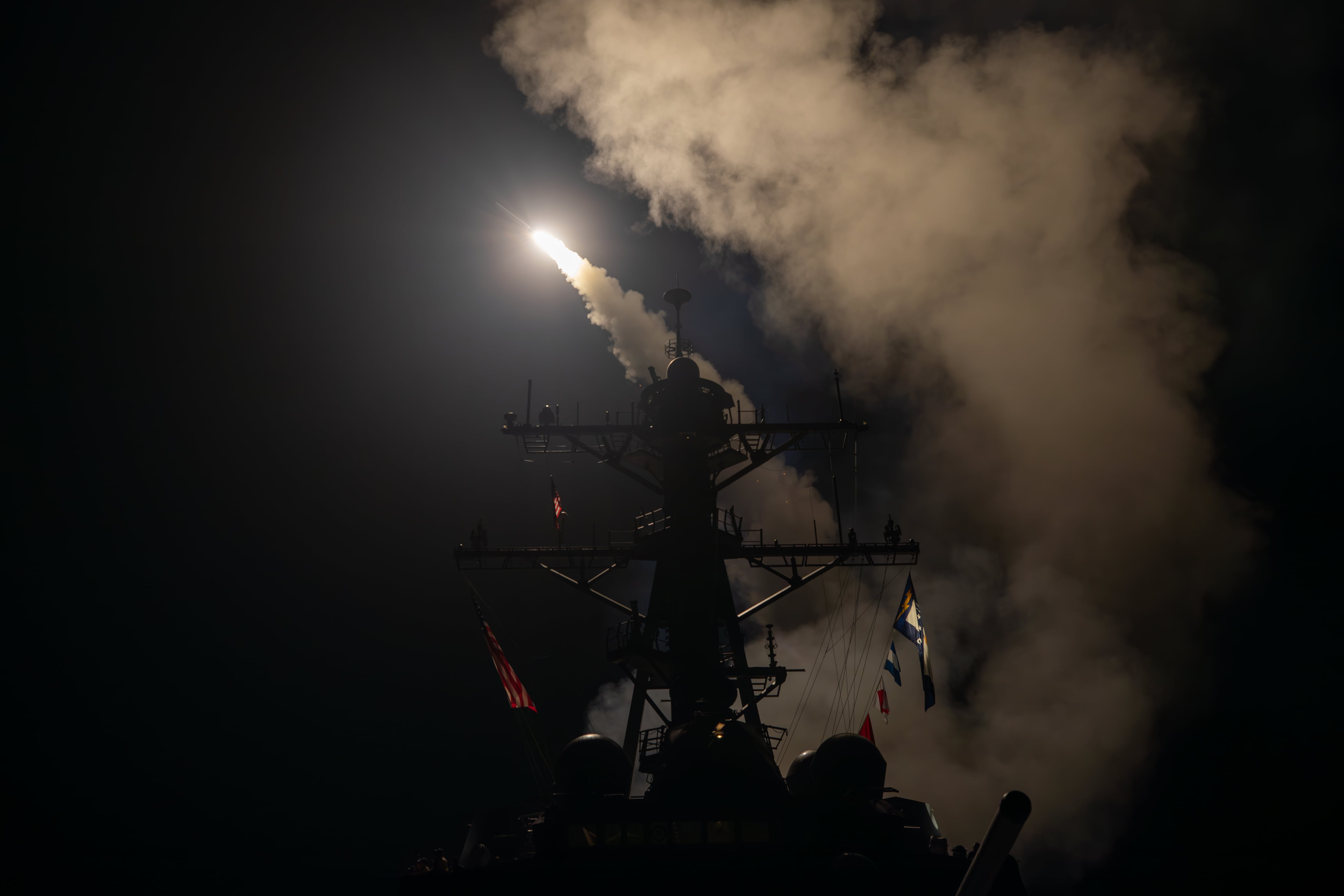RE’IM, Israel (AP) — Israelis held somber ceremonies Monday to mark a year since the deadliest attack in the country’s history, a Hamas-led raid that shattered its sense of security and has since spiraled into wars on two fronts with no end in sight.
Hamas marked the anniversary of its Oct. 7, 2023, attack by firing a barrage of rockets at Tel Aviv, underscoring its resilience after a year of war and devastation in Gaza. Lebanon’s Hezbollah, which began firing rockets at Israel on Oct. 8 in support of its ally Hamas, fired more than 170 rockets despite its recent losses.
The conflict soon drew in the United States military as well, and troops levels there remain higher than normal in order to prevent a bigger war from breaking out.
A few weeks after Hamas’ attack, on Oct. 19, the Navy destroyer Carney became the first American warship to take out a salvo of drones and missiles fired by Iran-backed Houthi rebels in Yemen.
That back-and-forth between the Houthis and the Navy has continued on a near-daily clip for the past year in the Red Sea and Gulf of Oman, and Navy ships have also played a role in shooting down Iranian missiles fired at Israel on two occasions.
U.S. ground forces have also endured months of attacks by Iran-backed militias in Syria and Iraq, although the frequency of such attacks has lessened.
Still, a January attack on the Tower 22 base on Jordan’s border with Syria killed three U.S. troops.
They are Sgt. Kennedy Sanders, Sgt. Breonna Moffett and Staff Sgt. William Rivers.
Questions have also emerged about how long the U.S. military — and the Navy in particular — can keep expending finite resources in the region.
As Prime Minister Benjamin Netanyahu vowed to press Israel’s campaigns on all sides, the military bombarded southern Lebanon with more than 120 strikes in an hour Monday, saying it was targeting Hezbollah positions. An earlier strike killed at least 10 Lebanese firefighters, the latest of dozens of first responders killed in recent weeks, according to Lebanon ‘s Health Ministry.
In a possible sign of the expansion of its campaign, the military said it would soon launch operations on Lebanon’s southern coast, telling residents to stay off the beaches and the sea for a 36-mile stretch along the Mediterranean.
In the Israeli-occupied West Bank, Israeli troops shot and killed a 12-year-old Palestinian boy in a refugee camp, Palestinian health officials said. The military said it opened fire on Palestinians throwing stones at its forces.
A year since Hamas’ surprise cross-border attack, the war in Gaza rages on even as Israel is fighting a new war against Hezbollah, escalating its bombing campaign in Lebanon the past three weeks. There is also a mounting conflict with Iran — which backs both Hamas and Hezbollah — that threatens to drag the region into an even more dangerous conflagration.
And within Israel, two main commemorations for the day underscored the country’s divisions. One was held by the government, the other in Tel Aviv by families of those killed on Oct. 7 and of hostages still held in Gaza who refused to join the official ceremony.
It was a sign of how Israelis’ faith in their leaders and military were shaken when the militants stormed out of Gaza, catching the country unprepared on a major Jewish holiday. The militants killed some 1,200 people, mostly civilians, and abducted another 250. Around 100 hostages have not been returned, a third of whom are believed to be dead, and cease-fire efforts have ground to a halt.
RELATED

No formal commemorative event is planned in Gaza, where Israel’s assault since Oct. 7 has killed more than 41,000 Palestinians, huge areas have been completely destroyed, most of the population have been driven from their homes and hunger is widespread.
At 6:31 a.m., four projectiles were launched from Gaza toward the same communities that came under attack last year, without disrupting ceremonies there.
The military said another five rockets were launched from the southern Gaza city of Khan Younis toward central Israel, setting off air raid sirens in Tel Aviv. Two women were lightly wounded, according to first responders, and there was minor damage. The military said it struck the launch sites.
Sirens blared a second time in central Israel hours later when Yemen’s Houthi rebels fired a ballistic missile. The military said the missile was intercepted.
RELATED

Israel responded to the Oct. 7 attack by launching one of the deadliest and most destructive military campaigns in recent history.
“We lost everything we have,” said Liyala al-Shanar, who fled her home in Gaza City. “We live in a tent that doesn’t protect us from the winter cold or the summer heat.”
Hamas’ fighters have repeatedly regrouped in areas where Israel carried out major operations. On Sunday, Israeli forces encircled the northern town of Jabaliya and launched another major operation there that the military says is aimed at rooting out militants.
The past year has seen a surge of violence in the West Bank, including Israeli raids on towns targeting armed groups, increased attacks by Palestinian militants and Jewish settler attacks on Palestinians.
In Lebanon, Hezbollah has kept up its fire even after intensified Israeli strikes have killed many in its top command — including longtime leader Hassan Nasrallah — and pounded large areas of Lebanon.
Israel’s strikes have killed at least 1,400 Lebanese, including civilians, medics and Hezbollah fighters, and 1.2 million have been driven from their homes. Lebanon’s Health Ministry said Monday’s strike that killed the 10 firefighters hit the municipality of the southern town of Baraachit just as they prepared for a mission. There was no immediate comment from the Israeli military.
Israel launched what has so far been a limited ground operation across the border last week. It says it aims to drive the militant group from its border so tens of thousands of Israeli citizens can return home.
Israel has also vowed to respond to a ballistic missile attack last week that Iran said was in response to the killings of Nasrallah, top Hamas leader Ismail Haniyeh and one of its own Revolutionary Guard generals.
Hezbollah said Monday it would continue its attacks until there is a cease-fire in Gaza, saying Israel “was and will remain a deadly, aggressive, cancerous gland that must be eliminated, no matter how long it takes.”
Geoff is the managing editor of Military Times, but he still loves writing stories. He covered Iraq and Afghanistan extensively and was a reporter at the Chicago Tribune. He welcomes any and all kinds of tips at [email protected].
Read the full article here
